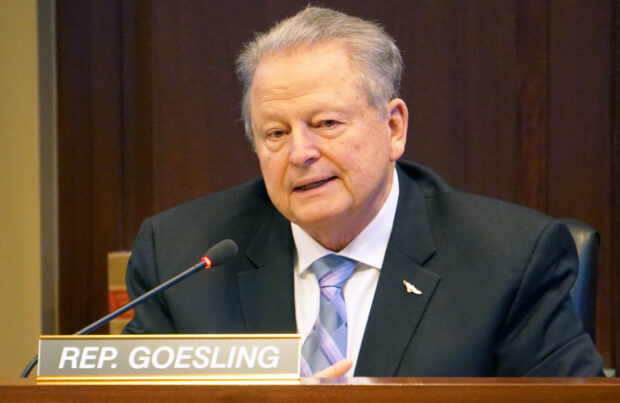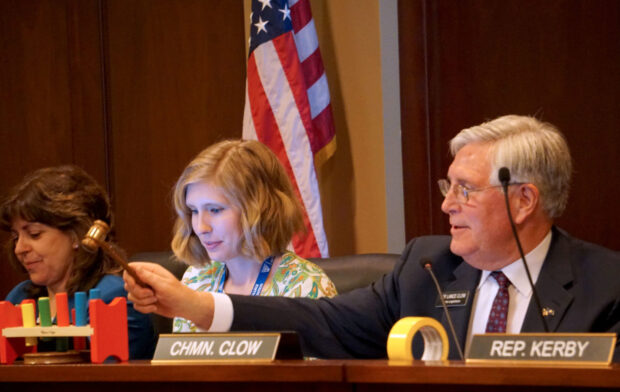The House Education Committee was one of the biggest wild cards from a divisive 2019 Idaho legislative session.
Over 95 freewheeling days, the committee acted as a cabal of strong personalities engaged in a power struggle, instead of a unified, strategic or predictable body.
The most revealing moment came when eight Republicans skipped the committee’s March 18 meeting, blocking first-year Chairman Lance Clow from conducting business. The Twin Falls Republican was unable to introduce a high-profile funding formula bill.
That wasn’t the only example.
- The committee was stacked with outspoken first- and second-term legislators who weren’t afraid to jump in the mix by sponsoring bills or stepping on toes.
- The committee never held a full hearing on a bill to rewrite Idaho’s public school funding formula — which loomed before the session as the top education issue of the year.
- Committee members regularly bumped heads with state agencies, including the State Board of Education.
- Providing no one a free pass, the committee killed bills from high-profile sponsors including Clow, Superintendent of Public Instruction Sherri Ybarra and a coalition of early childhood education advocates, even during normally routine introductory hearings.
- And it spent nearly two months scrutinizing administrative rules and grappling with the Senate Education Committee — foreshadowing a larger power struggle that extended the session and cast uncertainty over the future of agency rules in Idaho. The fight is likely to continue during the 2020 legislative session.

“There’s a new sheriff in town, the education committee,” said first-year Rep. Bill Goesling, R-Moscow, a former State Board member himself. “Both the House and Senate education committees have a clear directive to set policy for education in the state. Both the State Board and State Department need to understand that.”
For Rep. Judy Boyle, a Midvale Republican in her sixth term, the 2019 session was about House Education taking back control of the legislative process. She and others felt handcuffed by former Gov. Butch Otter’s 2013 Task Force for Improving Education.
“The Legislature is supposed to set the policy,” Boyle said. “By the Constitution, we set the law.”
Setting the stage
Developments in 2018 went a long way to setting the stage for a wild 2019.
Former Chairwoman Julie VanOrden and Vice Chairman Patrick McDonald lost re-election bids, setting up a leadership vacuum within the committee.
Then, in December’s organizational session, House Speaker Scott Bedke, R-Oakley, and legislative leadership shook up the committee by appointing six newcomers to House Education: Republicans Gary Marshall of Idaho Falls; Jerald Raymond of Menan; Tony Wisniewski of Post Falls; Barbara Ehardt of Idaho Falls; and Goesling; and Democrats Chris Abernathy of Pocatello and Steve Berch of Boise. These newcomers joined three other Republicans in their second terms: Gayann DeMordaunt of Eagle; Barbara Ehardt of Idaho Falls; and Dorothy Moon of Stanley.
Together, first- and second-term legislators account for nine of House Education’s 15 members.
The education and budget committees present a steep learning curve for new lawmakers. In addition to learning about drafting and debating bills, rookie legislators on the Education Committee needed to become proficient with the existing funding formula, the next year’s $1.9 billion budget proposal, a litany of laws and rules that govern everything from teacher evaluations to assessment and the proposal to transition to a new, enrollment-based funding model.
Goesling said his workload on House Education (which typically meets daily, although not always on Fridays) was more demanding than his other two committees (which met every other day).
“There is a lot for everybody to learn, and that’s what’s happening right now,” said Bedke, acknowledging the learning curve as it relates to school funding during a March 12 luncheon with the press corps.
First-year chairman
In December, Clow told Idaho Education News that serving as chairman of House Education “has been high on my personal priority list,” and he made it known to leadership he was interested in the post. Clow knows how to run a meeting, having served as Twin Falls mayor for six years and on the City Council 18 years. While he is well versed on parliamentary procedure and Robert’s Rules of Order and is a stickler for punctuality, Clow said there were many learning experiences this year.

“I could have done a better job integrating freshmen into the discussions earlier than I had,” he said.
Clow said he would have spent more time with the freshmen lawmakers, guiding them more in the process and building up relationships.
Some committee members felt Clow didn’t get to know the freshmen well or expected them to fall in line with a certain game plan.
“You can’t rush a cow out of the gate,” said Boyle, using an expression she said she and Bedke shared many times. “If you try to make that cow go through that gate, she’ll never see it. You can’t push them you have to let them walk up and see that this is a gate, but they have to go through it on their own.”
Put another way?
“You can’t force your ideas on a committee; that just takes time as a chairman to learn,” said Boyle, who has chaired the Agricultural Affairs Committee since 2017. “I’m not condemning him in the least. We have people who are very passionate about things and everybody has their own strengths.”
Overall, Clow was pleased with aspects of the session — such as passing legislation to give more flexibility to hire teachers through alternative pathways and allowing charter schools flexibility and support. He was also pleased with raising teacher pay, both through the career ladder and a bill to raise the minimum salary to $40,000 by 2021.
Clow called the failure to pass a new funding formula a big disappointment and said the blame should be split between the House and Senate education committees and the interim committee that developed the basics of the proposal. Clow was also disappointed at the failure of a bill to allow school districts to extend supplemental levies that have been on the books for at least seven consecutive years.
As for the March 18 protest, Goesling said legislators “jumped the chain of command.” But Goesling said he warned Clow that morning.
Clow maintains he was unaware so many committee members would be absent, preventing him from conducting business.
“You have to ask them where they were,” Clow said. “I’ve never boycotted a meeting or boycotted a vote.”
Nevertheless, Clow said he doesn’t hold a grudge and didn’t block any bills in retaliation.
Goesling described the state of the committee now as “happy people,” saying sometimes people bump heads and then back off.
What’s next?
In order to stay on top of the game, Clow suggested that he and Senate Education Chairman Dean Mortimer, R-Idaho Falls, hold informational joint sessions during the legislative offseason.
Goesling plans to follow the rule-making process closely.
Several House Education members will spend the offseason watching Gov. Brad Little’s forthcoming education task force.
Boyle felt adherence to the 2013 task force recommendations prevented legislators from legislating.
“We were literally told we couldn’t bring forth a bill that didn’t match one of their priorities,” Boyle said.
She said she’s shared those concerns with Little.
“I think all of us have talked to the governor’s staff,” Boyle said. “We do not want to see a repeat here where there are only 16 things that are allowed, and if you think outside of the box, too bad, you can’t.”
Goesling was also concerned about the level of influence education stakeholders had during funding formula discussions this year.
“It is my personal belief there was too much involvement by stakeholders that were at some of those early meetings, where you had 19 people at a table and five of them were legislators and the rest of them representatives of the various organizations,” he said.
That said, the stakeholders have proven influence in legislative circles, and many played a role in overturning the Legislature-passed Propositions 1, 2 and 3 in November 2012.
Regardless, Goesling envisions a new era where, in his words, House Education is “the player.”
“For years, I think what happened is the education committee set policy, but never followed up on that policy,” Goesling said. “That’s the key change I would like to see.”
Reporter Clark Corbin has provided daily coverage of the House Education Committee for Idaho Education News since the beginning of the 2013 legislative session.
